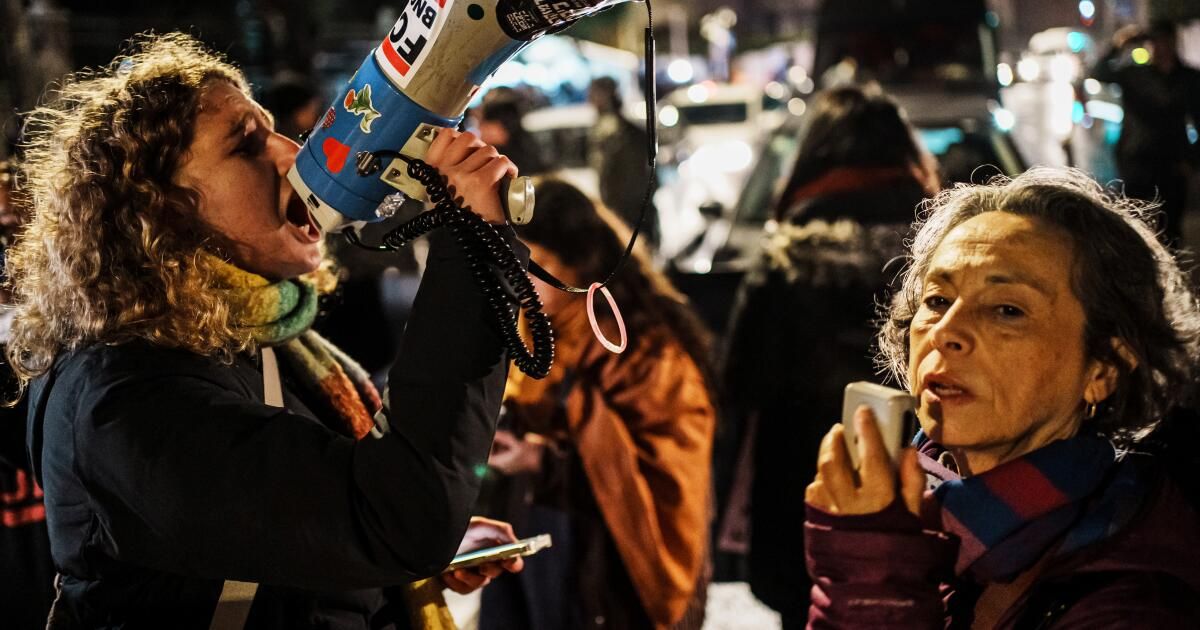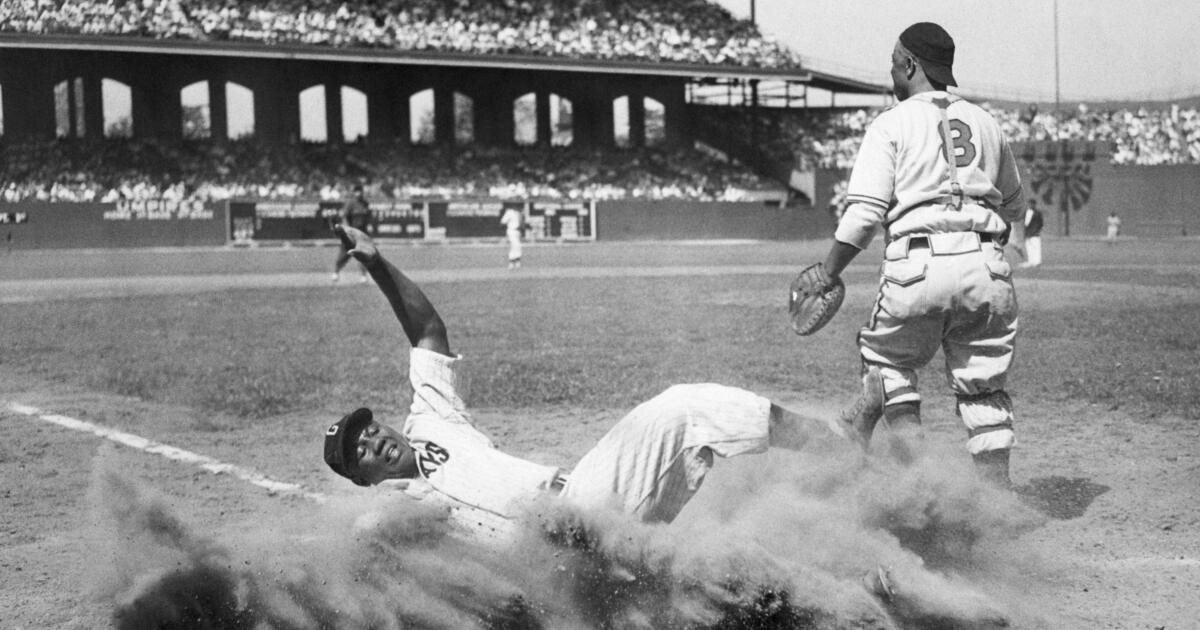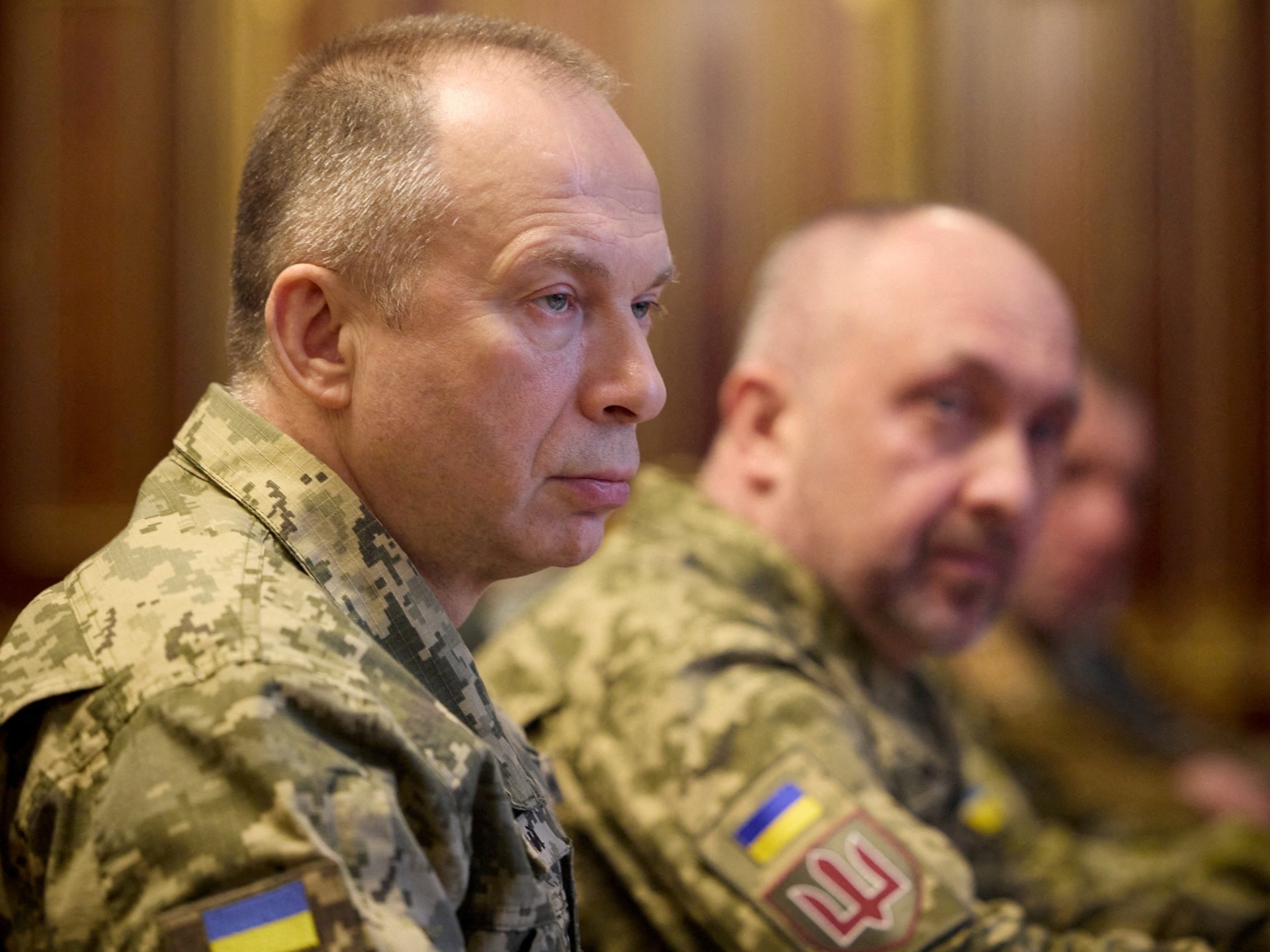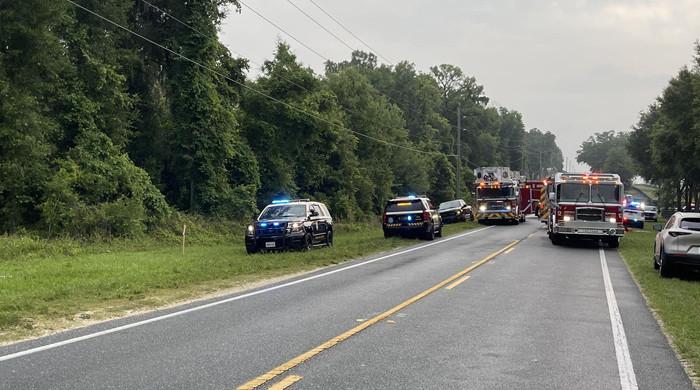In recent days, the families of Israeli hostages still held in Gaza have become increasingly desperate.
They stormed roads, blocked aid convoys heading to Gaza and set up a noisy protest camp outside Prime Minister Benjamin Netanyahu's Jerusalem home. This week, dozens of them stormed a session of parliament, shouting at lawmakers: “You will not sit here while our children die.”
More than three months into Israel's campaign to destroy Hamas, many of the families have become disillusioned with the war and are convinced that only a ceasefire – and no more military operations – will free their loved ones.
Their call for Israel to do whatever is necessary to secure the hostages' release has put them at odds with Netanyahu, who has vowed that the siege of Gaza will continue “until the end, until total victory.”
This week Netanyahu said he rejected a Hamas ceasefire proposal because it called for Israel's complete withdrawal from Gaza.
Israelis are increasingly divided over the best path forward for the war, which began on October 7 when Hamas militants swept into southern Israel in the worst terrorist attack in the nation's history. Around 1,200 people were killed and more than 200 kidnapped.
Israel retaliated with massive airstrikes on the Gaza Strip and a ground invasion that local health officials said killed 26,000 Palestinians. The war has weakened but not eliminated Hamas.
Israeli soldiers have rescued only one hostage. Another died in a botched rescue operation and three died after soldiers mistook them for militants. The vast majority of the 110 who returned home were freed during a ceasefire and prisoner exchange brokered in November by the United States, Egypt and Qatar.
Commuters riding a bus in central Jerusalem on Wednesday watch as their vehicle is held up in traffic congestion caused by protesters raising awareness about hostages still trapped in Gaza.
(Marcus Yam/Los Angeles Times)
Families of the 105 hostages believed to be alive in Gaza say another deal is urgently needed.
“Every day is critical,” said Elad Or, whose brother Dror, 48, was kidnapped along with his two children from their home in a kibbutz near the Gaza border. Dror's wife was killed in the attack.
The couple's children, who were freed as part of the November agreement, shared harrowing details about their conditions in captivity: earth-shaking bombs and shortages of food and water. Or he said he and other family members of hostages have adopted more confrontational tactics in recent days because the government's current strategy is not working “and time is running out.”
“We are demanding that they make life a priority,” he said. “This is my only chance to see my brother again. And this is the only chance my nephews have to have a father.”
Outside Netanyahu's gated residence, where protesters pitched tents this week, volunteers bring them cookies, sweet bread and soup. Neighbors shyly approach and offer to wash clothes, charge cell phones or take a hot shower.
Israelis have been obsessed with the hostages' plight, posting their photos on social media and wearing dog tag necklaces in their honor. Seemingly on every corner in the country there are signs saying, “Bring them home now.”
Still, there is no consensus among Israelis or their government when it comes to another ceasefire, said Mairav Zonszein, an analyst at the International Crisis Group. Ultimately, he said, public support for a deal “comes down to what the actual details of a deal would be.”
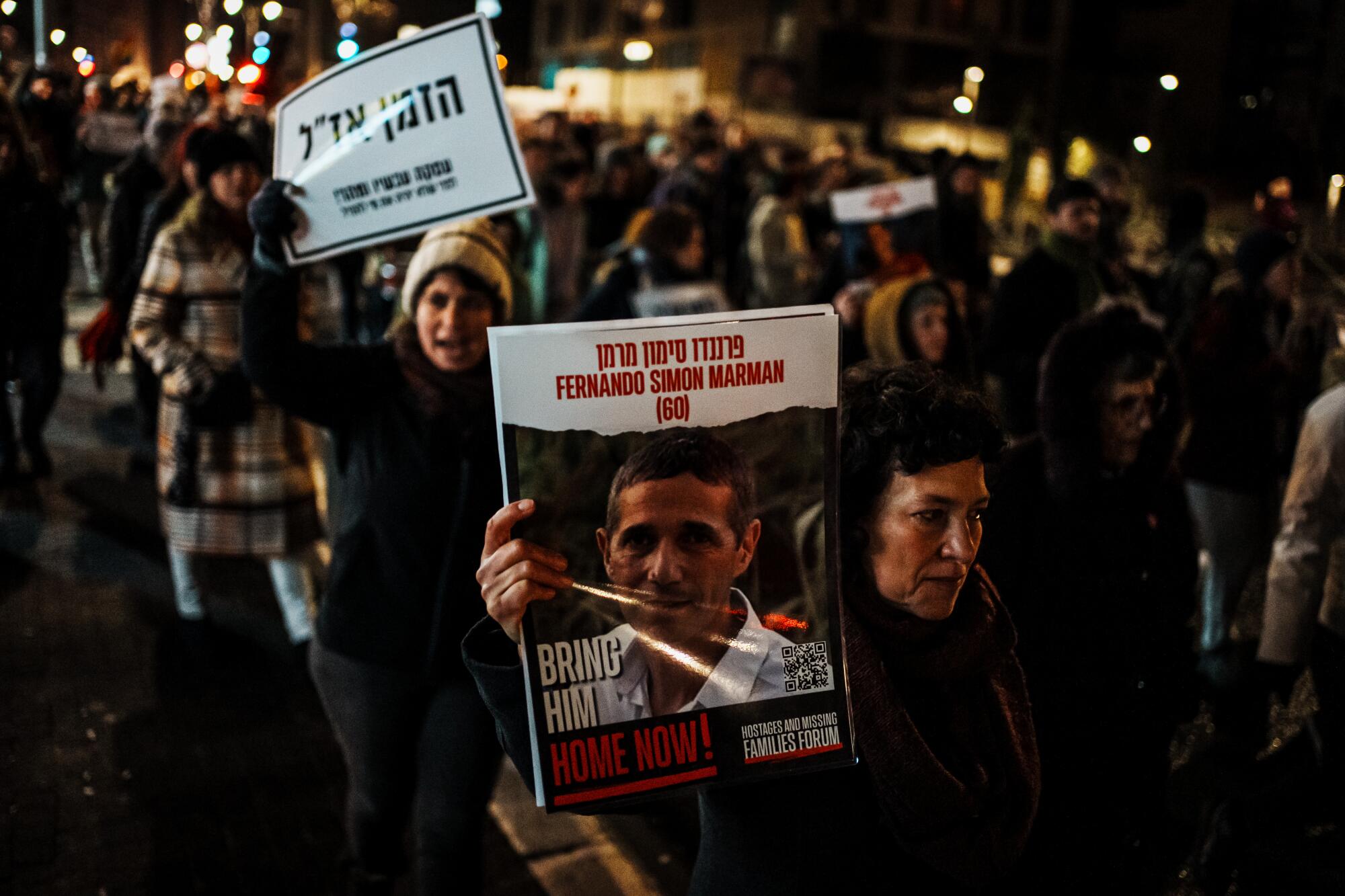
Protesters in Jerusalem hold signs on behalf of the hostages in Gaza on Wednesday during a march organized by women's groups aimed at raising awareness about the plight of the hostages.
(Marcus Yam/Los Angeles Times)
Many Israelis and right-wing members of Netanyahu's government believe that any deal conditional on Israel's withdrawal from Gaza and the release of Palestinian prisoners amounts to defeat.
But as the hostages' families become increasingly active and Israeli casualties mount (24 soldiers killed in Gaza in a single day this week), even some military leaders have begun to question Netanyahu's strategy and urge him to negotiate. .
Lt. Gen. Gadi Eisenkot, a senior Israeli wartime cabinet minister, said this week that Netanyahu's promise to eradicate terrorists from Gaza is unrealistic. “We did not overthrow Hamas,” he said.
Eisenkot, whose son was killed while fighting in Gaza in December, said preserving the lives of captives should be the priority, whatever the cost.
“It is not possible to return the hostages alive without an agreement,” he said.
Globally, Netanyahu has faced calls to stop the war, including from the United States, which provides Israel with large amounts of weaponry, and has criticized the scale of death and destruction in Gaza.
Adding to the pressure is an accusation by South Africa before the International Court of Justice that Israel is carrying out genocide in Gaza. The court is expected to rule Friday on whether it will request an emergency suspension of Israel's military actions while it debates the merits of the case.
Netanyahu has insisted that Israel will continue its war regardless of the court's decision. “No one will stop us,” he said this month. “Neither The Hague… nor anyone else.”
The hostages' families have met repeatedly with government officials and in recent weeks have become convinced that Israel's leaders are prioritizing a military strike over reaching a deal to bring the prisoners home.
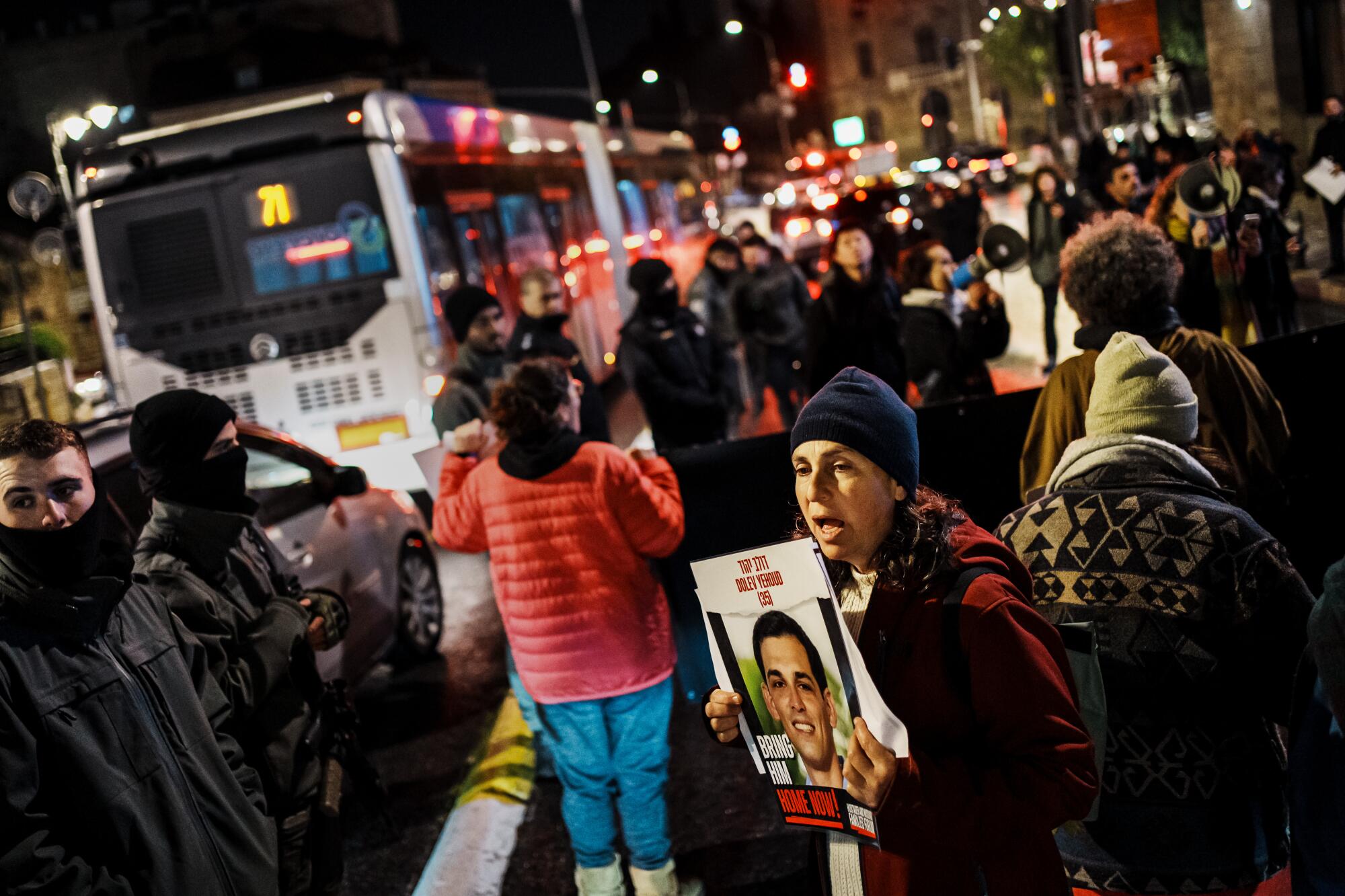
Protesters hold signs indicating hostages in Gaza and cause traffic congestion during a march in Jerusalem on Wednesday organized by women's groups aimed at raising awareness about the plight of hostages still held in Gaza.
(Marcus Yam/Los Angeles Times)
“I don't feel like they're taking us seriously,” said Dalia Cusnir, 42, whose two brothers-in-law were kidnapped from Kibbutz Nir Oz and remain in captivity.
“We felt abandoned and betrayed on October 7,” he said. “And we feel like we've been abandoned and betrayed over and over again since then.”
She is one of dozens of protesters who stormed the Knesset, or parliament, on Monday, disrupting a committee meeting.
“Yesterday, the prime minister stood up and said there will be no deal,” shouted one of them, Zohar Avigdori. “Behind whose back?”
In another Knesset hearing this week, a freed hostage, Aviva Siegel, testified that she witnessed sexual violence perpetrated against other hostages while they were in Gaza.
“I saw it with my own eyes,” he said, adding that the victims were both women and men.
“Right now someone is being raped in a tunnel,” her daughter, Shir, told lawmakers.
Yair Moses, whose 79-year-old father was taken hostage, said families will take more radical action to make authorities take into account the crisis.
“We can't sleep at night,” said Moses, who has held a vigil outside Netanyahu's house. “And we don't want them to be able to sleep either.”
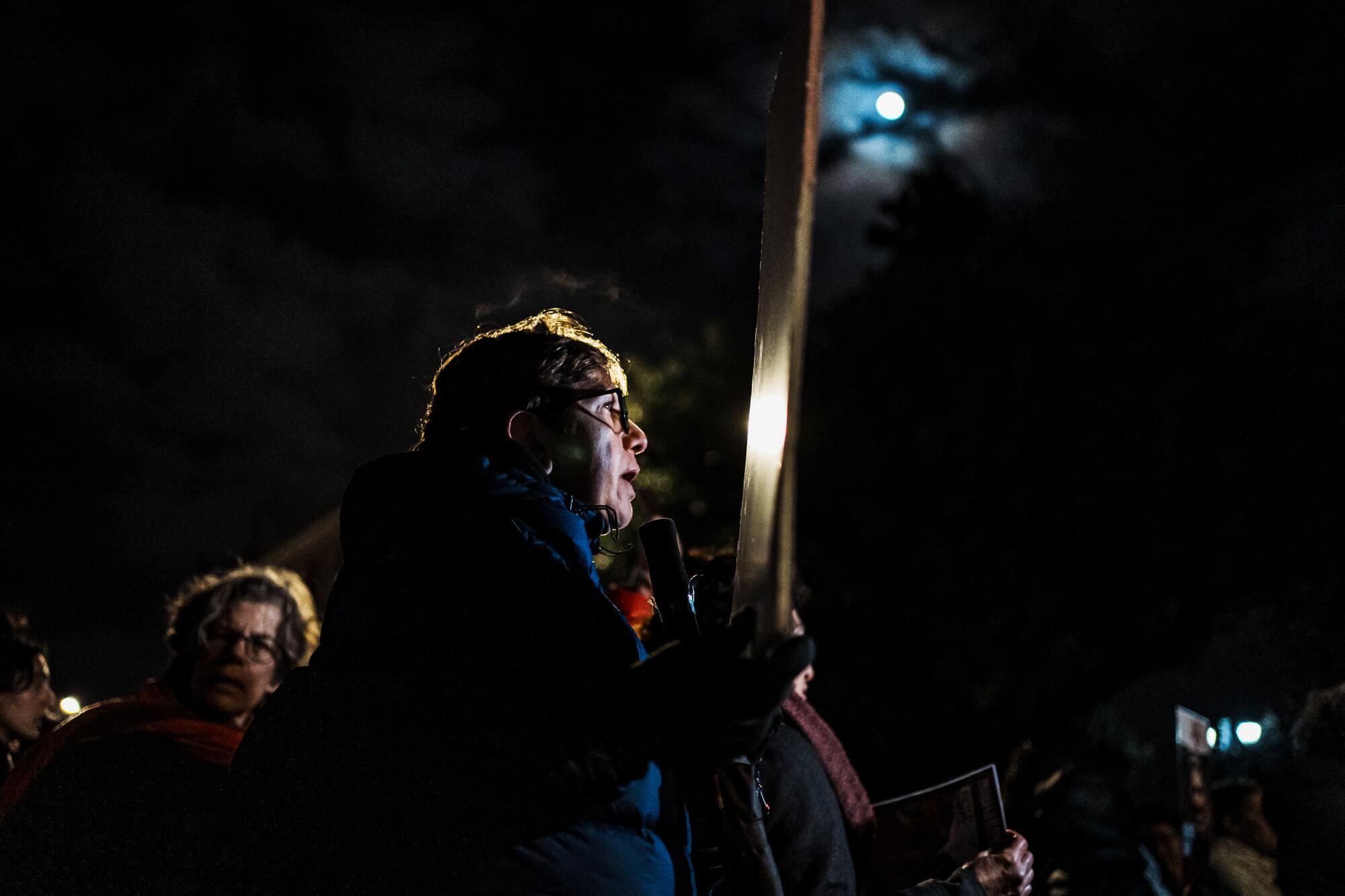
Gabriela Leimberg, 59, who survived captivity as a hostage in Gaza, joins others in Jerusalem on Wednesday to protest and raise awareness for the hostages still trapped in Gaza.
(Marcus Yam/Los Angeles Times)
On Wednesday night, several hundred protesters attended a demonstration in support of the hostages. As they marched near Jerusalem's Old City, they faced shouts from passersby opposing a ceasefire.
Leah Amit, a 29-year-old woman who identifies as center-right, said she attended the rally because she is concerned about the direction of the country.
“It doesn't seem like they have everything under control,” he said.
“Netanyahu is saying we are winning the war,” he said. “But no one feels like we're winning anything.”
Some said Netanyahu, who before the war broke out was the target of months of street protests calling for his ouster, appears focused on his political survival.
He is fighting a series of corruption accusations and his critics say he wants to maintain power to avoid going to jail.
“For his political survival, he needs the war to continue,” said protester Gilad Kaplan. “If the hostages return, there is no reason to continue the war.”
Nightly protests outside Netanyahu's home have even attracted former hostages.
Gabriela Leimberg, 59, was kidnapped from a kibbutz along with several family members. After spending more than a month in captivity, wondering each day if it would be their last, everyone was freed except Leimberg's brother and brother-in-law.
Leimberg said he is pushing for a negotiated release of hostages because he remembers, while still in captivity, the hope he felt when he heard news of possible negotiations.
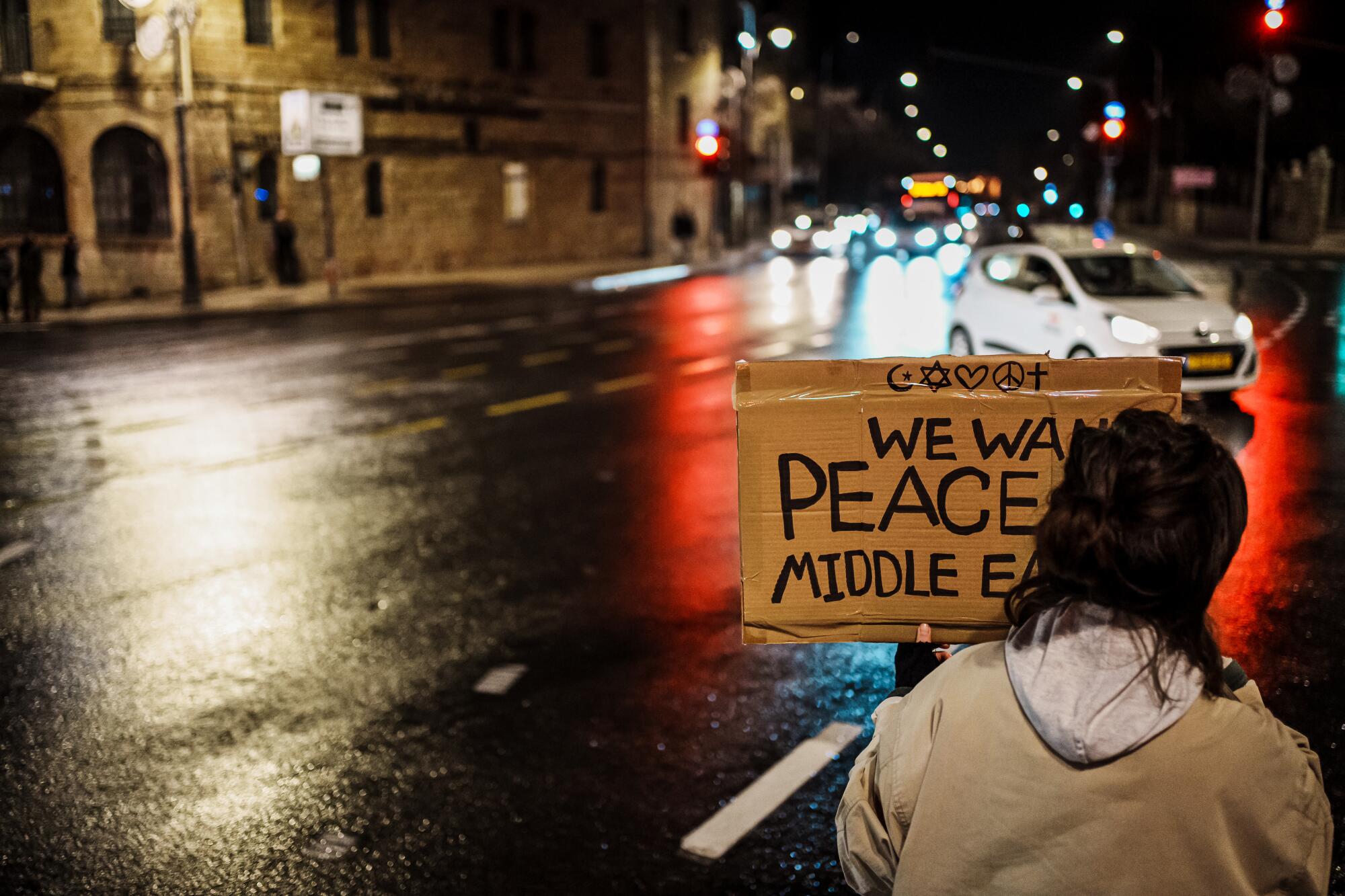
Protesters hold signs indicating hostages in Gaza and cause traffic congestion in Jerusalem on Wednesday during a march organized by women's groups aimed at raising awareness about the plight of hostages still held in Gaza.
(Marcus Yam/Los Angeles Times)
“The only way they will come back is with a deal,” he said.
Until then, she said, she feels like a part of her is with the captives in Gaza.
“When I eat hot food, I think about them,” he said. “When I put on warm clothes, I think about her. “I am distraught.”

